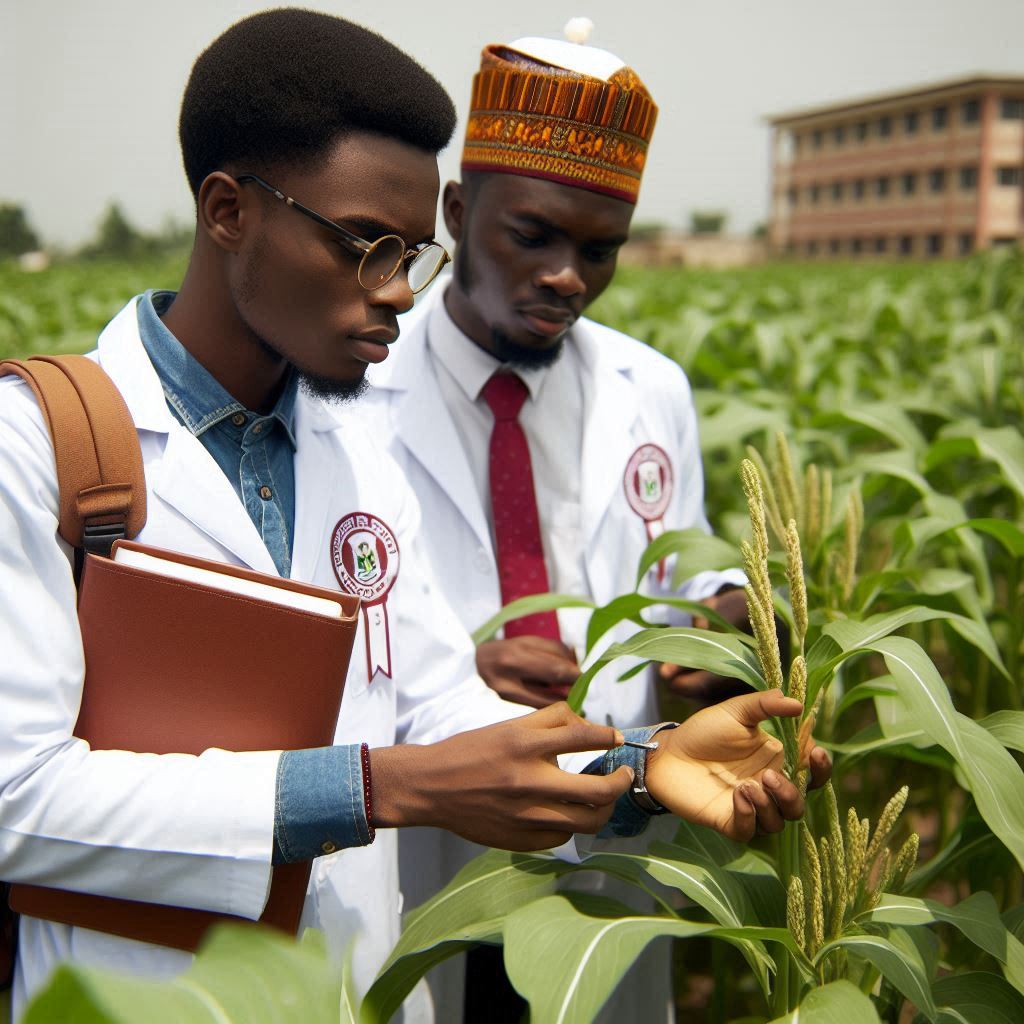Introduction
Organic farming, a method that relies on natural inputs and practices, promotes soil health and biodiversity. It rejects synthetic fertilizers, pesticides, and genetically modified organisms.
Advocates of organic farming emphasize the importance of sustainable agriculture for environmental conservation and human health.
Understanding Organic Farming
Organic farming prioritizes the use of natural resources and processes, fostering ecological balance and biodiversity. It involves techniques such as crop rotation, composting, and biological pest control.
Importance of Organic Farming in Sustainable Agriculture
Organic farming plays a crucial role in sustainable agriculture by preserving soil fertility and minimizing environmental impact. It promotes biodiversity, reduces water pollution, and mitigates climate change.
Preservation of Soil Fertility
Organic farming techniques like composting and crop rotation enhance soil fertility without depleting natural resources. Healthy soil supports plant growth, increases resilience to pests and diseases, and sequesters carbon dioxide.
Minimization of Environmental Impact
By avoiding synthetic fertilizers and pesticides, organic farming reduces the risk of soil and water contamination. This protects ecosystems, preserves wildlife habitats, and promotes overall environmental health.
Promotion of Biodiversity
Organic farms typically harbor greater biodiversity compared to conventional farms. This diversity supports pollinators, natural pest predators, and beneficial microorganisms, contributing to ecosystem resilience and stability.
Reduction of Water Pollution
Organic farming practices, such as minimal tillage and cover cropping, help prevent soil erosion and runoff. This reduces the contamination of water bodies with sediment, nutrients, and harmful chemicals.
Mitigation of Climate Change
Organic farming practices can sequester carbon in the soil, helping to mitigate climate change. Additionally, by avoiding the use of fossil fuel-based inputs, organic farming reduces greenhouse gas emissions.
Growing Interest in Organic Farming Globally
In recent years, there has been a significant increase in the global interest in organic farming. Consumers are becoming more conscious of the environmental and health impacts of conventional agriculture.
Consumer Demand for Organic Products
The demand for organic food and products continues to rise as consumers seek healthier and more sustainable options. This trend is driving the expansion of organic farming worldwide.
Government Support and Policy Initiatives
Many governments are implementing policies to promote organic farming, providing financial incentives and support to farmers. These initiatives aim to transition agriculture towards more sustainable practices.
Organic farming offers a promising alternative to conventional agriculture, promoting environmental sustainability and human health.
As interest in organic farming grows globally, integrating it into Nigerian education can foster a new generation of environmentally conscious farmers and consumers.
The Current State of Agriculture in Nigeria
Conventional farming methods in Nigeria face multifaceted challenges. Limited access to modern technology hampers productivity. Soil degradation due to intensive chemical use exacerbates the issue.
Additionally, erratic weather patterns pose significant threats to crop yields.
Small-scale farmers, comprising a substantial portion of Nigeria’s agricultural workforce, often lack adequate training and resources. Consequently, productivity remains low, inhibiting economic growth and food security.
Challenges Facing Conventional Farming Methods
Access to modern technology is a significant challenge. High costs associated with equipment and machinery limit adoption.
Moreover, reliance on chemical fertilizers and pesticides leads to soil degradation and environmental pollution. Inefficient irrigation systems exacerbate water scarcity issues, further impeding agricultural development.
Additionally, inadequate infrastructure hinders the transportation of agricultural produce to markets, leading to post-harvest losses.
Highlighting the Need for Sustainable Farming Practices
Amidst these challenges, the imperative for sustainable farming practices becomes evident. Sustainable agriculture emphasizes environmental stewardship, economic profitability, and social equity.
By adopting such practices, farmers can mitigate the adverse effects of conventional methods. Conservation tillage techniques help preserve soil structure and fertility.
Integrated pest management reduces reliance on harmful chemicals, promoting natural pest control.
Furthermore, water conservation strategies, such as drip irrigation, optimize resource utilization and minimize wastage.
Introducing Organic Farming as a Viable Solution
Organic farming emerges as a viable solution to the shortcomings of conventional agriculture. Rooted in principles of ecological balance and biodiversity conservation, organic farming prioritizes natural inputs and techniques.
By eschewing synthetic chemicals and genetically modified organisms, organic farmers safeguard soil health and water quality.
Crop rotation and intercropping enhance soil fertility and resilience, reducing the reliance on external inputs.
Additionally, organic farming fosters community engagement and empowerment, promoting inclusive rural development.
Generally, the state of agriculture in Nigeria underscores the urgency of transitioning towards sustainable practices.
Conventional farming methods, plagued by numerous challenges, necessitate a paradigm shift towards more resilient and environmentally friendly approaches.
Organic farming presents a compelling alternative, offering holistic solutions to the complex issues facing Nigerian agriculture.
By embracing organic principles, farmers can not only enhance productivity and profitability but also contribute to the long-term sustainability of Nigeria’s agricultural sector.
Read: Online Courses in Curriculum Studies Nigeria
Benefits of organic farming in Nigerian education
Organic farming is gaining traction globally for its sustainable practices and environmental benefits. In Nigeria, integrating organic farming into education can revolutionize learning experiences and equip students with essential skills for the future.
Integration into the Curriculum: A Paradigm Shift
The traditional education system in Nigeria often focuses solely on theoretical learning, neglecting practical application. Introducing organic farming into the curriculum offers a refreshing approach, bridging the gap between theory and practice.
Potential Impact on Students’ Knowledge and Skills
By immersing students in organic farming practices, educators can cultivate a deeper understanding of agricultural concepts. Through hands-on experiences, students learn to appreciate the intricacies of ecosystem dynamics, soil health, and plant biology.
Cultivating Environmental Awareness
Organic farming emphasizes sustainable methods that prioritize soil health, biodiversity, and natural resource conservation.
Integrating these principles into education fosters environmental stewardship among students, instilling a sense of responsibility towards the planet.
Nurturing Critical Thinking and Problem-Solving Skills
Engaging in organic farming requires students to analyze real-world challenges and develop innovative solutions.
From pest management strategies to crop rotation techniques, students actively participate in problem-solving exercises, honing their critical thinking abilities.
Fostering Entrepreneurial Spirit
Organic farming presents numerous entrepreneurial opportunities in Nigeria’s agricultural sector.
By exposing students to practical aspects of farming, such as crop planning, marketing strategies, and value-added product development, educators nurture an entrepreneurial mindset from a young age.
Promoting Health and Well-being
Organic farming prioritizes natural inputs and prohibits the use of synthetic pesticides and fertilizers, resulting in healthier food products.
Educating students about the benefits of organic agriculture promotes healthier dietary choices and contributes to overall well-being.
Strengthening Community Connections
Engaging in organic farming encourages students to connect with local communities and agricultural stakeholders.
Through partnerships with farmers, NGOs, and government agencies, students gain valuable insights into the socio-economic aspects of agriculture while fostering community resilience.
Empowering Future Leaders in Agriculture
By equipping students with practical farming skills and a deep understanding of sustainable agriculture, educators empower them to become future leaders in the agricultural sector.
These skilled individuals will drive innovation, promote sustainability, and address food security challenges in Nigeria and beyond.
In essence, Integrating organic farming into Nigerian education is not merely about cultivating crops;
it’s about nurturing a generation of environmentally conscious, skilled individuals poised to tackle the challenges of tomorrow.
By embracing organic farming in education, Nigeria paves the way for a sustainable and prosperous future.
Read: Tech-Enhanced Learning in Nigerian Schools
Initiatives and Organizations Promoting Organic Farming
In Nigeria, several initiatives and organizations champion organic farming. They educate farmers on sustainable practices. These groups include the Organic Farmers Association of Nigeria (OFAN), which provides training and resources.
Additionally, the Nigeria Organic Agriculture Network (NOAN) connects farmers, researchers, and policymakers. These networks facilitate knowledge exchange and support for organic farming.
They promote organic certification and help farmers access markets. Moreover, non-governmental organizations (NGOs) like the Sustainable Agriculture Network (SAN) promote organic farming.
They work with farmers to adopt environmentally friendly practices. These initiatives play a crucial role in raising awareness and building capacity.
Government Policies Supporting Organic Farming
Government policies in Nigeria are gradually recognizing the importance of organic farming. The National Organic Agriculture Policy was launched in 2014.
It aims to promote organic farming and agro-processing. Additionally, the government provides subsidies and incentives for organic farmers.
These policies encourage farmers to adopt organic practices. However, more efforts are needed to fully integrate organic farming into national agricultural strategies.
Success Stories in Organic Farming Education
Some schools and institutions in Nigeria have integrated organic farming into their curriculum. For example, the Federal University of Agriculture, Abeokuta, offers courses in organic agriculture.
They have a demonstration farm where students practice organic farming techniques. Similarly, the Oyo State College of Agriculture and Technology includes organic farming in its programs.
They teach students about soil health, composting, and crop rotation. These initiatives not only impart knowledge but also instill a sense of environmental stewardship.
Students learn practical skills while contributing to sustainable agriculture. Moreover, some primary and secondary schools have established school gardens.
These gardens serve as outdoor classrooms where students learn about plant life cycles and ecosystem dynamics.
They also cultivate vegetables for school meals, promoting healthy eating habits. These success stories demonstrate the potential of integrating organic farming into education.
In a nutshell, organic farming initiatives in Nigeria are growing, thanks to the efforts of various organizations and government policies.
By promoting sustainable practices and integrating organic farming into education, Nigeria can build a more resilient and environmentally friendly agricultural sector.
However, continued support and investment are essential to ensure the long-term success of organic farming in the country.
Read: Tech Tools for Nigerian Curriculum Developers

Challenges in Implementing Organic Farming in Nigerian Education
Identifying Barriers
- Lack of Resources: Limited funding constrains access to essential tools and equipment.
- Infrastructure Shortcomings: Inadequate facilities hinder the practical aspects of organic farming education.
- Insufficient Training: Educators and farmers lack comprehensive training in organic farming techniques.
Cultural and Societal Factors
- Traditional Practices: Cultural norms favor conventional farming methods over organic alternatives.
- Market Demands: Societal preference for mass-produced, chemically treated crops poses a challenge.
- Education System Bias: Emphasis on conventional agriculture in curricula neglects organic farming education.
Overcoming Challenges
- Resource Mobilization: Government and NGOs must allocate funds for organic farming education initiatives.
- Infrastructure Development: Investment in farm facilities and laboratories enhances practical training opportunities.
- Training Programs: Implementing workshops and courses to educate educators and farmers on organic practices.
- Cultural Awareness Campaigns: Promoting the benefits of organic farming within communities to shift perspectives.
- Market Incentives: Creating incentives for organic produce encourages farmers to adopt sustainable practices.
- Curriculum Integration: Including organic farming modules in educational curricula to foster awareness from an early age.
In the pursuit of integrating organic farming into Nigerian education, several challenges must be addressed. The scarcity of resources, inadequate infrastructure, and the lack of training pose significant hurdles.
Additionally, cultural and societal factors perpetuate the dominance of conventional farming practices. However, through strategic interventions, these obstacles can be overcome.
By mobilizing resources, improving infrastructure, and promoting cultural awareness, the adoption of organic farming can be facilitated.
Training programs, market incentives, and curriculum integration further support this transition.
Ultimately, a concerted effort from government, NGOs, educators, and farmers is crucial in realizing the potential of organic farming within Nigerian education.
Read: Nigerian Curriculum Studies Academic Journals
Training Teachers and Students in Organic Farming: A Vital Step
In the realm of sustainable agriculture, education plays a pivotal role. Teachers and students alike need comprehensive training in organic farming techniques to foster a future of environmental stewardship and food security.
Importance of Training
Equipping educators with the knowledge and skills of organic farming empowers them to integrate sustainable practices into the curriculum effectively.
Students, in turn, receive accurate and practical guidance, nurturing their understanding of ecological systems and agricultural methods.
Benefits of Hands-on Training
Hands-on training offers invaluable experiential learning opportunities. Through direct engagement with organic farming techniques, students develop a profound understanding of soil health, biodiversity conservation, and natural pest management.
Practical experience fosters critical thinking and problem-solving skills, as students encounter real-world challenges and devise solutions within the context of sustainable agriculture.
Additionally, it instills a sense of responsibility towards the environment and promotes an appreciation for the interconnectedness of ecosystems.
Transform Your Career with Expert Guidance
Get personalized mentorship consulting that’s tailored to your unique path. Our expert advice is actionable and exclusive.
Get StartedSuccessful Training Programs
Across the globe, numerous training programs have demonstrated efficacy in promoting organic farming education.
In the United States, initiatives such as the National Center for Appropriate Technology’s Sustainable Agriculture Education and Training (SARE) program provide resources and workshops for educators to integrate organic farming principles into their teaching.
Similarly, the European Union’s Erasmus+ program funds projects focused on agricultural education, including organic farming modules and exchanges between educational institutions.
In developing nations like India, organizations like the Centre for Sustainable Agriculture conduct teacher training workshops and student internships, fostering a generation of eco-conscious farmers and educators.
Case Study: The Farmer Field School Approach
One notable example of successful training in organic farming is the Farmer Field School (FFS) approach, pioneered by the Food and Agriculture Organization (FAO).
FFS engages farmers and educators in participatory learning activities conducted directly in the field. Through observation, experimentation, and group discussions, participants acquire practical skills and knowledge in organic farming techniques.
Studies have shown that FFS participants achieve higher yields, reduced pesticide use, and increased incomes compared to conventional farming methods. Moreover, FFS enhances community cohesion and knowledge-sharing among farmers, contributing to sustainable rural development.
In review, Incorporating organic farming education into Nigerian schools is not merely a pedagogical endeavor but a crucial step towards building a resilient and sustainable agricultural sector.
By investing in training for teachers and students, Nigeria can cultivate a new generation of environmentally-conscious farmers equipped to tackle the challenges of the 21st century.
Learn More: Impact of Agricultural Education on Nigerian Youth
Integration of organic farming into existing agricultural programs
Organic farming presents a promising avenue for sustainable agriculture in Nigeria. Its integration into existing agricultural programs holds immense potential for fostering innovation and promoting eco-friendly practices.
In this section, we will delve into the ways organic farming can be seamlessly incorporated into the Nigerian education system.
Integration into Existing Agricultural Courses
To integrate organic farming into existing agricultural courses, universities and colleges can introduce specialized modules or elective courses focused solely on organic farming practices.
These courses can cover topics such as organic soil management, pest control methods, and organic certification processes.
Potential for Interdisciplinary Learning and Collaboration
The incorporation of organic farming into agricultural programs offers an opportunity for interdisciplinary learning and collaboration.
Students studying agronomy, environmental science, and even business administration can benefit from understanding the principles and practices of organic farming.
Collaborative projects involving students from different disciplines can foster a holistic approach to sustainable agriculture.
Role of Research and Innovation
Research and innovation play a pivotal role in advancing organic farming practices within the educational framework.
Universities can establish research centers dedicated to organic farming, where students and faculty can conduct studies on soil health, crop rotation techniques, and organic pest management strategies.
These research endeavors not only contribute to academic knowledge but also provide practical solutions to real-world farming challenges.
Case Study
The University of Ibadan, for instance, has recently introduced a new course titled “Organic Farming and Sustainable Agriculture.”
This course incorporates elements of traditional agricultural practices with modern organic farming techniques.
Students are actively involved in fieldwork, experimenting with organic fertilizers, and studying the ecological impact of organic farming on local ecosystems.
In short, the integration of organic farming into existing agricultural programs in Nigeria holds immense promise for sustainable agriculture.
By incorporating specialized courses, fostering interdisciplinary collaboration, and emphasizing research and innovation, educational institutions can prepare the next generation of farmers and agricultural professionals to embrace eco-friendly farming practices.
This holistic approach not only benefits the environment but also contributes to the long-term food security and economic prosperity of Nigeria.
Partnerships: Building Bridges for Sustainable Agriculture
Partnerships between schools, government agencies, and NGOs are pivotal in advancing organic farming within Nigerian education.
Such collaborations form the backbone of sustainable agricultural practices, fostering a holistic approach towards food security and environmental preservation.
Importance of Partnerships
In the realm of organic farming, partnerships play a vital role in harnessing collective efforts and resources. Schools act as educational hubs, imparting knowledge and nurturing future leaders in agriculture.
Government agencies provide policy frameworks and support, ensuring a conducive environment for organic farming initiatives.
NGOs bring advocacy, expertise, and grassroots connections, bridging the gap between theory and practice.
Opportunities for Collaboration
Collaborating with local farmers and community organizations presents a myriad of opportunities for promoting organic farming.
By tapping into local wisdom and traditional farming practices, educational institutions gain practical insights into sustainable agriculture.
Engaging with farmers also cultivates a sense of ownership and empowerment within the community, fostering a collaborative spirit towards shared goals.
Benefits of Knowledge Sharing
Sharing knowledge, resources, and expertise among stakeholders yields multifaceted benefits in promoting organic farming within Nigerian education.
Schools gain access to practical demonstrations and hands-on experiences, enriching their curriculum with real-world applications.
Government agencies benefit from grassroots feedback and local perspectives, ensuring policies resonate with on-the-ground realities.
NGOs leverage their networks and advocacy platforms to raise awareness and drive collective action towards sustainable agriculture.
Fostering Innovation
Partnerships and collaborations stimulate innovation by fostering interdisciplinary approaches and knowledge exchange.
Schools can integrate organic farming into various subjects, nurturing students’ creativity and problem-solving skills.
Government agencies can pilot innovative policies and programs in collaboration with educational institutions, leveraging their infrastructure and expertise.
NGOs can facilitate technology transfer and capacity-building initiatives, empowering farmers with tools and techniques for sustainable farming practices.
Empowering Communities
By working together, stakeholders contribute to the empowerment of local communities, creating opportunities for economic growth and social development.
Schools serve as catalysts for community engagement, organizing workshops, and outreach programs to disseminate knowledge about organic farming.
Government agencies facilitate access to markets and financing schemes, empowering farmers to adopt organic practices profitably.
NGOs facilitate partnerships between different stakeholders, fostering inclusive and participatory approaches towards sustainable development.
In fact, partnerships and collaborations are indispensable in promoting organic farming within Nigerian education.
By harnessing the collective strengths of schools, government agencies, NGOs, and local communities, we can cultivate a shared vision of sustainable agriculture that nourishes both people and the planet.
Through knowledge sharing, innovation, and community empowerment, we can pave the way for a greener, healthier future for generations to come.
Conclusion
Key Points Summarized
Organic farming offers sustainable solutions. It enhances soil fertility, conserves water, and promotes biodiversity. Students learn practical skills and theoretical knowledge.
Incorporating organic farming into the curriculum benefits students and the environment. Nigeria’s agricultural sector stands to gain significantly.
Organic farming aligns with global sustainability goals. It addresses food security challenges and mitigates climate change impacts. Education plays a pivotal role in fostering sustainable practices.
By integrating organic farming into education, Nigeria cultivates future leaders.
These leaders will champion sustainable agriculture and drive positive change. Overall, organic farming in Nigerian education empowers students and transforms communities.
Reiterating Importance
Organic farming in Nigerian education is not just an option; it’s a necessity. It equips students with essential skills. These skills are vital for addressing contemporary agricultural challenges.
Organic farming fosters environmental stewardship and resource conservation. It instills values of responsibility and innovation in future generations.
Embracing organic farming aligns with Nigeria’s development objectives. It promotes economic growth, environmental sustainability, and social equity.
By prioritizing organic farming in education, Nigeria invests in its future. It ensures food security, environmental resilience, and economic prosperity. Moreover, organic farming in education empowers communities and fosters self-reliance.
Encouraging Further Action
To advance sustainable agriculture in Nigeria, concerted efforts are needed. Governments must prioritize organic farming in education policies.
Educational institutions should integrate organic farming into their curricula. This integration should span from primary to tertiary levels.
Research institutions should conduct studies on organic farming’s efficacy and impact. Collaboration between academia, government, and industry is essential.
Stakeholders should provide resources and support for organic farming initiatives. Community engagement and awareness campaigns are crucial.
Encouraging farmers to adopt organic practices is imperative. Training programs and capacity-building initiatives should be expanded.
Overall, promoting organic farming requires a holistic approach. It demands commitment, innovation, and collaboration from all sectors.
In closing, organic farming holds immense promise for Nigerian education. It equips students with practical skills, fosters environmental stewardship, and promotes sustainable development.
Embracing organic farming is not just an educational imperative; it’s a societal necessity. Nigeria must prioritize organic farming in education to cultivate a generation of responsible, innovative, and environmentally conscious leaders.
By doing so, Nigeria can ensure a sustainable future for its people and the planet. Let’s sow the seeds of change and reap the harvest of a greener, healthier Nigeria.




